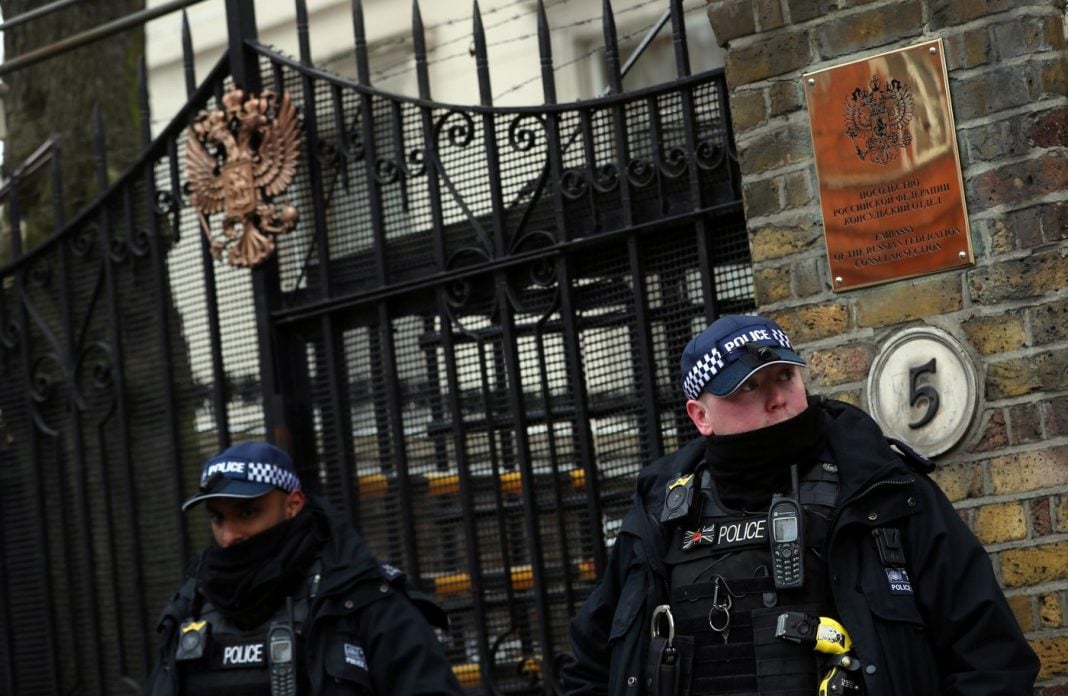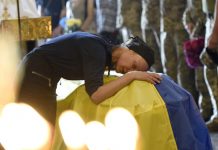By Julia Davis, for CEPA
In the ethereal world of Russian state media, Vladimir Putin is never to blame for anything bad. Russia’s almost-emperor is above rebuke — an unwritten rule his otherwise cynical and snarling propagandists obediently follow.
Conveniently, however, there is a long-established lineup of the usual suspects, presented to domestic and international audiences whenever blame has to be assigned. The United States is prominent in this list, but what really gets the Kremlin’s mouthpieces agitated is the diabolical work of the United Kingdom, invariably referred to as England.
The latest case in point is the untimely demise of Yevgeny Prigozhin, the Wagner Group’s head mercenary, who had led the organization on a bloody but lucrative global rampage funded by the Kremlin. The ex-convict enjoyed easy access to Vladimir Putin even as the Russian government constantly refused to admit that the group even existed.
From Ukraine and Syria and the interference in US elections, Prigozhin enjoyed the status of Putin’s untouchable shadow warrior— until his poorly judged mini-mutiny in June put an end to his sledgehammer-wielding reign of terror.
Once the short-lived uprising was over, the Kremlin’s mouthpieces on state television were furious. Despite Putin’s public assurances that all was forgiven, official propagandists revealingly insisted that Prigozhin was a traitor and should die, along with his right-hand man, the founder of Wagner, Dmitry Utkin. Prigozhin must have realized that this did not augur well.
During the first post-mutiny broadcast of the TV show, Sunday Evening With Vladimir Solovyov, State Duma member, General Andrey Gurulyov, retired deputy commander of the 58th Combined Arms Army, said: “I am firmly convinced that during wartime, traitors have to be destroyed! Today, no matter who says what, whatever fairy tales they are telling, a bullet to the forehead is the sole salvation for Prigozhin and [Dmitry] Utkin. They know me! They know that I stand behind my every word. There is no other option!”
Gurulyov suggested Prigozhin and Utkin be given the option of committing suicide, or else being executed for their actions, as he reiterated: “Treason cannot be forgiven under any circumstances! It simply can’t be forgiven, regardless of any past achievements! I will repeat it once again: the only way out for these friends is to kill themselves before a bullet finds them! There are no other options for traitors.”
Just as Gurulyov had predicted, Prigozhin and Utkin perished in a fiery plane crash on August 23, two months to the day after their mutiny began. Many noted they had been meeting with unnamed Kremlin officials just before the fatal flight — providing a convenient way for anyone interested to track their whereabouts thereafter.
The smoking remnants of the warlord’s personal jet had barely cooled before the propaganda narrative took a bizarre twist. The same propagandists who insisted that Prigozhin must die now dismissed the possibility that the Kremlin had heeded their demands, and focused on deflecting the blame from Putin.
Leading Russian propagandist Vladimir Solovyov immediately pointed the finger at the regime’s default enemy: “The Anglo-Saxons are undoubtedly behind this crime!” This despite his call one day before the crash for someone had to be held accountable for the deaths of as many as 15 Russian Air Force pilots shot down by Wagner during the course of the mutiny.
So great is Russia’s habit of framing the proverbial “Anglo-Saxons” as the perennial suspects, that they are being blamed not only for past offenses but also for future crimes. After forensic testing reportedly confirmed Prigozhin’s death, former politician Igor Markov appeared on Sunday evening with Vladimir Solovyov, to blame the British, to predict that General Sergey Surovikin — a top Russian general sacked but not seen since the failed insurrection — might be next.
Discussing Prigozhin’s demise, Markov feverishly stated: “I think, special services of only two countries were capable of this: the US and Britain . . . I have no doubt this is the handiwork of the British!” He added, “All that’s missing for a complete picture is for Surovikin to die of a heart attack! I’m not joking, he should be very careful, they will be doing this! In order for them to complete all of their puzzles, this is all that is missing.”
This statement caused some alarm among those in the Kremlin overseeing state propagandists, who immediately cut this portion of Markov’s diatribe from the broadcast. The show’s rerun was missing any mention of Surovikin, as did the archived recording on its official website. That portion of the program, which formerly started at 02:22:07, was neatly removed.
This is unusual since even the most outlandish statements on state TV shows are usually left intact. Perhaps Surovikin truly is in danger, due to his alleged prior knowledge of Prigozhin’s mutiny. And blaming the British would be a lot harder if this retribution had previously been predicted on Kremlin-controlled state television.
Regardless of what happens next, Russia always includes the British on the list of its top suspects. This is not a coincidence, but a well-established tradition. The phrase Anglichanka gadit, which means, “The English are causing us problems,” is a well-known expression that is used to describe everything from sanctions to assassinations. Its first utterance is ascribed, albeit without proof, to the legendary Russian General Alexander Suvorov in the 18th century.
It has remained in circulation ever since, having been immortalized in poetry during the reign of the last Emperor of Russia, Nicholas II, and repeatedly used in literary works ever since. A slightly modified version of the expression was even included in the Explanatory Dictionary of the Russian Language in 1935, underlining its deep roots among Soviet communists who had fought a fierce shadow war with Britain’s MI6. This concept remains heavily entrenched in Russia’s popular culture and psyche.
The Kremlin’s 2006 assassination of Alexander Litvinenko and the 2018 poisoning of Sergei Skripal on British soil made for convenient occasions to use this catchall phrase. The evergreen expression usually accompanies calls from top Kremlin propagandists to turn Great Britain into a radioactive wasteland using Russia’s nuclear weapons.
That however would be a waste. Without Britain, who could be blamed for dastardly acts?
By Julia Davis, for CEPA
Julia Davis is a columnist for The Daily Beast and the creator of the Russian Media Monitor. She is a member of the Academy of Television Arts and Sciences, the Screen Actors Guild, and Women In Film.
Europe’s Edge is CEPA’s online journal covering critical topics on the foreign policy docket across Europe and North America. All opinions are those of the author and do not necessarily represent the position or views of the institutions they represent or the Center for European Policy Analysis.





